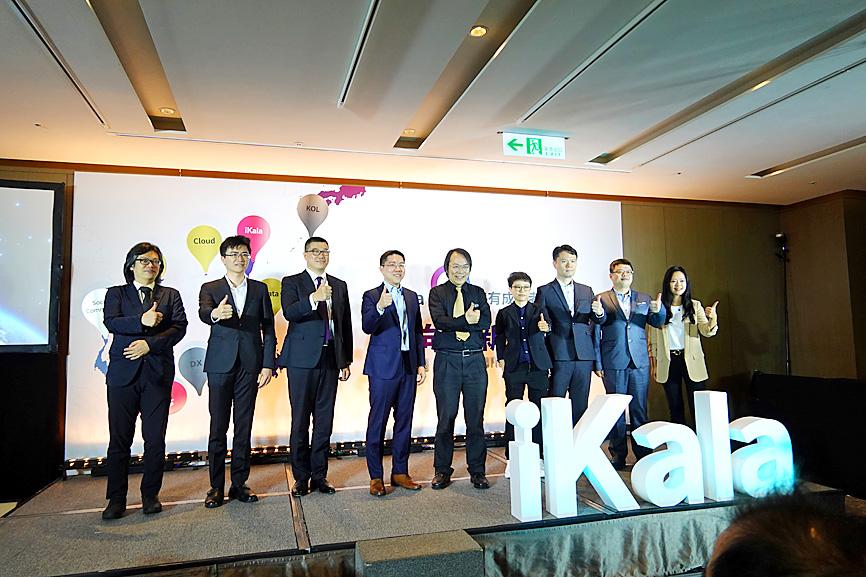IKala Interactive Media Inc (愛卡拉), which uses artificial intelligence (AI) technology to help e-commerce retailers gather and analyze customer data, yesterday said it has established a new commerce division, after the COVID-19 pandemic boosted demand for online shopping, gaming and e-learning, causing its revenue to rise 45 percent annually in the first quarter.
The company is tapping into rapid-growing AI-powered social commerce — where people use social networks to sell and buy goods — in Southeast Asian countries such as Vietnam, Thailand and Singapore, iKala said.
For instance, Facebook Shops last month introduced a way for Facebook and Instagram users to browse and purchase items without leaving the apps, as opposed to being rerouted through Amazon.com Inc.

Photo: Chen Ping-hung, Taipei Times
As people are confined at home and students are learning online, “enterprises are accelerating digitization and boosting digital marketing [to meet demand] after the pandemic broke out early this year,” iKala’s cofounder and chief executive officer Sega Cheng (程世嘉) told a news briefing in Taipei.
Online shopping, gaming and e-learning are the three areas that grew the fastest in the first quarter, at an annual pace of between 20 and 40 percent, Cheng said.
IKala counts Momo.com (富邦媒體) and Sinyi Realty Inc (信義房屋) among its customers.
Former Google Taiwan managing director Chien Lee-feng (簡立峰) joined its board of directors early this year.
Chien also serves as board director of another AI company, Appier Inc (沛星互動科技).
The new division, iKala Commerce, uses AI technology to help customers — mostly e-commerce retailers — gather personal data and access customer information to provide personalized services and customized content by recording customers’ behavior, the company said.
The company three months ago hired Alex Lin (林濬暘) to lead the new business as chief commercial officer.
With the data of 50,000 key opinion leaders, iKala also helps online retailers connect with social media personalities to sell their goods and boost sales.
Cheng said that the company expects the new social commerce business to become one of its revenue contributors.
Next year, the social commerce business is expected to make up 50 percent of the company’s revenue, Cheng said.
IKala’s cloud-based services contribute to between 60 and 70 percent of overall revenue, he added.
The new division is this year expected to generate more revenue than last year’s NT$500 million (US$16.8 million), he added.
Asked whether the company has any plans to launch an initial public offering, Cheng said that three years from now might be the right time.
IKala, which is nine years old, completed its series A funding of US$10 million earlier last year, with investments from Hotung Venture Group (和通創投), Pacific Venture Partners (怡和創投) and ACE Capital (鉑鈞資本).

NEW IDENTITY: Known for its software, India has expanded into hardware, with its semiconductor industry growing from US$38bn in 2023 to US$45bn to US$50bn India on Saturday inaugurated its first semiconductor assembly and test facility, a milestone in the government’s push to reduce dependence on foreign chipmakers and stake a claim in a sector dominated by China. Indian Prime Minister Narendra Modi opened US firm Micron Technology Inc’s semiconductor assembly, test and packaging unit in his home state of Gujarat, hailing the “dawn of a new era” for India’s technology ambitions. “When young Indians look back in the future, they will see this decade as the turning point in our tech future,” Modi told the event, which was broadcast on his YouTube channel. The plant would convert

‘SEISMIC SHIFT’: The researcher forecast there would be about 1.1 billion mobile shipments this year, down from 1.26 billion the prior year and erasing years of gains The global smartphone market is expected to contract 12.9 percent this year due to the unprecedented memorychip shortage, marking “a crisis like no other,” researcher International Data Corp (IDC) said. The new forecast, a dramatic revision down from earlier estimates, gives the latest accounting of the ongoing memory crunch that is affecting every corner of the electronics industry. The demand for advanced memory to power artificial intelligence (AI) tasks has drained global supply until well into next year and jeopardizes the business model of many smartphone makers. IDC forecast about 1.1 billion mobile shipments this year, down from 1.26 billion the prior

People stand in a Pokemon store in Tokyo on Thursday. One of the world highest-grossing franchises is celebrated its 30th anniversary yesterday.

Zimbabwe’s ban on raw lithium exports is forcing Chinese miners to rethink their strategy, speeding up plans to process the metal locally instead of shipping it to China’s vast rechargeable battery industry. The country is Africa’s largest lithium producer and has one of the world’s largest reserves, according to the US Geological Survey (USGS). Zimbabwe already banned the export of lithium ore in 2022 and last year announced it would halt exports of lithium concentrates from January next year. However, on Wednesday it imposed the ban with immediate effect, leaving unclear what the lithium mining sector would do in the